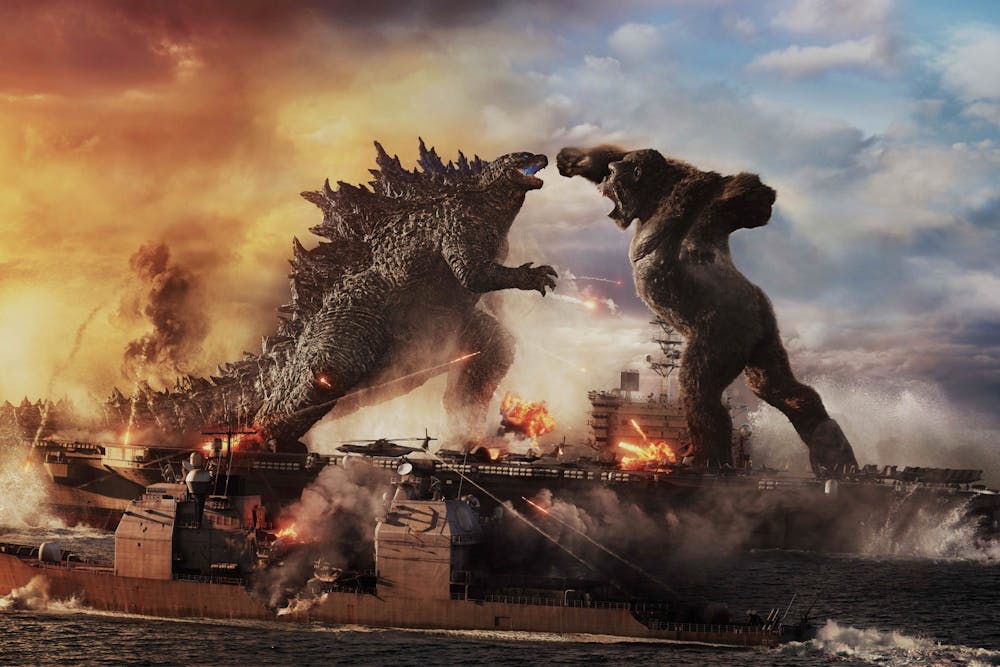The battle for the ages has finally arrived with “Godzilla vs. Kong,” the latest installment in Legendary’s “MonsterVerse” series, coming to the big screen on Wednesday.
Directed by Adam Wingard, this sequel to “Godzilla: King of the Monsters” pits the titular nuclear lizard against Skull Island’s own monstrous ruler, King Kong, in an all-out brawl to determine who is the true alpha monster.
It’s easy to see why fans would be drawn to this new entry; after all, who doesn’t want to watch a movie about two big monsters slapping each other senseless?
However, beneath all of the spectacle and mayhem, there’s one aspect of the franchise this new entry subtly honors and updates — the propensity for biting political commentary.
READ MORE: Vampires, ghosts and ... plants? Where the horror genre will go post-Trump
The formula of Godzilla battling other giant beasts is so ingrained in its franchise that many forget the original 1954 film was an exercise to deal with national trauma. Following the bombing of Hiroshima and Nagasaki, Japan was left with lingering fear over the destructive power that nuclear weapons posed.
When Toho unveiled the original film, the bleak story of nuclear destruction left quite an impact.
Japanese audiences were reportedly left in tears by how unrelentingly tragic the film was, resulting in a boost in popularity so great that Western studios would release an Americanized version two years later. The success of the original movie and its U.S. localization cemented the radioactive sea monster as a pop culture icon.
From the beginning, Godzilla was intended as a guardian of the natural order: a walking force of nature out to get revenge on humanity for creating the nuclear bomb and to knock us down a peg.
As time went on, the franchise's focus changed. Sequels began introducing other monsters for Godzilla to fight. Over time, Godzilla went from a punishment for humanity to a defender of it, squaring off against monsters who sought to destroy Earth and its occupants.
Legendary’s MonsterVerse films, which began with the 2014 film “Godzilla,” once again established this titular monster as a defender of nature who battles other monsters who threaten the world.
On the surface, this latest depiction of Godzilla as a protector seems to leave the political themes of older entries behind. But for some, such as “Godzilla vs. Kong” actor Brian Tyree Henry, the political commentary roots of the franchise still play a large role.
“Even in these worlds, it’s still kind of political,” Henry said. “They use these platforms sometimes to talk about the things that are going on in our world like climate change.”
Set just a few years after the defeat of the villainous dragon King Ghidorah, “Godzilla vs. Kong” presents the atomic reptile on a rampage, hurting the humans who once viewed him as their savior.
To try to stop him, a team of scientists under the guidance of tech company “Apex Cybernetics” is forced to relocate Kong from his unstable home to find the mysterious “Hollow Earth" and an energy source that could prove useful in stopping Godzilla’s attacks.
By the film's end, it is revealed the reason for Godzilla’s rage was not a mysterious, natural force, but one manufactured by Apex being a massive mechanical beast dubbed Mechagodzilla that quickly turns on its creators for a final confrontation between both Godzilla and Kong.
It’s a reveal that isn’t exactly surprising, given that glimpses of the metal titan were caught by eagle-eyed fans in the trailers. However, what it lacks in the element of surprise, it makes up for in thematic relevance.
For much of the new films, Godzilla has been a neutral force for guarding the Earth, indifferent to humans and only saving the world through his own desire to stay at the top of the food chain. To Godzilla, monsters like Kong or Ghidorah actually serve as threats to his existence, making them ideal targets.
When Godzilla finally attacks humans, it’s not because he decided to turn evil. It’s because humans began looking for ways to take him down. In creating Mechagodzilla, Apex chose to disrupt the natural order with the company’s founder Walter Simmons (played by Demián Bichir) even remarking that his goal is to establish humanity as the new apex predator.
It is this arrogance that leads to Simmons' downfall, when Mechagodzilla becomes sentient and goes on its own destructive rampage. Humans tried to play God, and they paid the price for it.
It takes the combined effort of Godzilla and Kong to take the mechanical menace down, resulting in a truce between the organic titans. At this point, the message is clear. In trying to establish human superiority, we are incurring the wrath of nature.
Our machinations will inevitably betray us, and in the end, nature will fix our mistakes. If Godzilla and Kong are representations of the natural world, Mechagodzilla is what we will create if we continue down this path of believing we are the ultimate creatures.
The allegory of Godzilla has shifted. What was once a commentary on nuclear warfare has evolved into a representation of the natural order.
While “Godzilla vs. Kong” does deliver on the classic monster action we’ve come to expect from the franchise, it also manages to expertly update the classic horror and political commentary for a whole new era.
Reach the reporter at nmdelga3@asu.edu and follow @DelGoada on Twitter.
Like The State Press on Facebook and follow @statepress on Twitter.
Continue supporting student journalism and donate to The State Press today.




